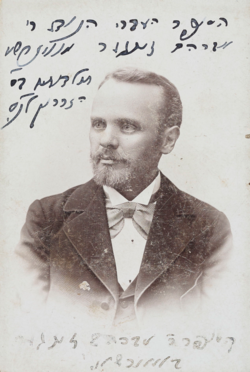Abraham Zinger
Abraham Zinger | |
|---|---|
 Portrait of Zinger by W. Twardzicki | |
| Native name | אברהם זינגער |
| Born | 1864 Kapulye, Minsk Governorate, Russian Empire |
| Died | 1920 (aged 55–56) Babroysk, Minsk Governorate, Russian Empire |
| Language | Hebrew, Yiddish |
| Spouse |
Penina (Paulina) Lowenthal
(m. 1895) |
Abraham Zinger (Hebrew: אברהם זינגער; 1864, Kapulye – 1920, Babroysk) was a Russian-Jewish author, feuilletonist, and translator.
Biography
[edit]Zinger was born in Kapulye, Minsk Governorate. Orphaned at the age of 10, he studied at Minsk, Slutsk, Pinsk, Nesvizh, and Mir, meanwhile encountering Haskalah literature.[2]
He worked as a Hebrew teacher in Warsaw from 1888,[3] but fled to his hometown during the Russian withdrawal from Poland in 1915.[4] Amid the pogroms following Operation Minsk, he attempted in 1920 to return to Warsaw, but contracted typhus on the way there. He succumbed to the disease in Bobruisk.[2]
Work
[edit]In about 1885, Zinger began writing stories and articles for Hebrew periodicals like Ha-Melitz, Ha-Asif, and Knesset Israel.[5] As a literary critic, he reviewed the Hebrew poetry of I. L. Peretz, among other writers.[6] He later also contributed to the Yiddish journals Der Yud, Der Tog, and Unzer Leben.[4]
Under the title Ohel Tom, he published in 1896 a Hebrew translation of Harriet Beecher Stowe's Uncle Tom's Cabin; or, Life Among the Lowly. David Ben-Gurion would later cite Zinger's translation as influential on his ideological development.[7][8]
Partial bibliography
[edit]- "Masekhat kala" [A Bride's Mask]. Ha-Melitz (in Hebrew). 20 (91). Saint Petersburg: 2–3. December 1884.
- "Gever lo yitzlaḥ" [A Man That Will Not Prosper]. Aḥiasaf (in Hebrew). 6. Warsaw: Defus Shuldberg ve-shutafo: 85–103. 1887.
- "Ye'ush she-lo mida'at" [Despair Without Awareness]. Aḥiasaf (in Hebrew). 6. Warsaw: Defus Shuldberg ve-shutafo: 20–45. 1888.
- "ʿAl em ha-derekh" [At the Crossroads]. Ha-Asif (in Hebrew). 5. Warsaw: Defus R. Me'ir Yeḥiel Halter: 65–102. 1889.
- "Tzarat ha-bat" [The Daughter's Woes]. Ha-Melitz (in Hebrew). 29 (41, 43–4, 46–7, 50–1, 55, 58, 60, 62, 65–6, 68–72, 74, 80, 86–7, 89). Saint Petersburg. March–May 1889.
- "Nefashot porḥot" [Blossoming Souls]. Ha-Melitz (in Hebrew). 29 (107, 109, 112, 116, 119–20). Saint Petersburg. May–June 1889.
- Mishut ba-aretz [Wandering Around the Earth] (in Hebrew). Warsaw: Defus Levinski. 1890.
- "Met mitzvah. Zikhron le-David holekh ve-lo yashuv od" [An Abandoned Corpse]. Keneset Ha-gedolah. 2 (3). Warsaw: Defus R. Me'ir Yeḥiel Halter: 36–50. 1890.
- "Ḥag ha-aviv" [The Festival of Spring]. Ha-Melitz (in Hebrew). 31 (84–5). April 1891.
- Korban ha-yom: tsiyur me-ḥaye bene ʻamenu ba-yamim ha-aḥaronim [Sacrifice of the Day: A Portrait of the Lives of Our People in the Days of Past] (in Hebrew). Warsaw: Defus ha-aḥim Shuldberg. 1893.
- Devar kol ḥazon [The Word of Every Prophecy] (in Hebrew). Saint Petersburg: Defus Berman ve-Rabinovitz. 1894.
- "Teshuva le-dorot" [Repentance for the Generations]. Talpiot (in Hebrew) (6). Berdichev: Defus shel Ḥayyim Ya'akov Sheptil: 50–57. 1895.
- "ʿAl lev Yerushalayim" [On the Heart of Jerusalem]. Talpiot (in Hebrew) (11). Berdichev: Defus shel Ḥayyim Ya'akov Sheptil: 1–5. 1895.
- Stowe, Harriet Beecher (1896). Ohel Tom, o, ha-ḥayim ben ʻavde ʻolam [Uncle Tom's Cabin; or, Life Among the Lowly] (in Hebrew). Translated by Zinger, Abraham. Warsaw: L. Zuckermann.
- "Yesurin shel ahava" [Sufferings of Love]. Ha-Zman (in Hebrew). Warsaw: Defus E. Boymritter: 91–100. 1896.
- "Tzitz novel" [A Withered Flower]. Ha-Shiloaḥ (in Hebrew). 3. Berlin: Defus Tzvi Hirsch ben R. Yitzḥak Itzkovski: 253–262. 1898.
- "Tsvey sdorim" [Two Siddurs]. Der Yud (in Yiddish). 3 (14–15). Krakaw: 23–26. 3 April 1901.
- Beli tekumah: sipur me-ḥaye bene Yisraʼel bi-shenot ha-shemonim [Without Resistance] (in Hebrew). Saint Petersburg: Defus Ha-Melitz. 1902.
References
[edit]- ^ Rapoport, Shabtai (1 July 1895). "Et kenos". Ha-Melitz (in Hebrew). Vol. 35, no. 133. Saint Petersburg.
- ^ a b Fogel, Joshua (24 August 2016). "Avrom (Avraham) Zinger". Yiddish Leksikon. Retrieved 4 January 2021.
- ^ . Brockhaus and Efron Encyclopedic Dictionary (in Russian). Vol. 7. Saint Petersburg. 1910. p. 790.
{{cite encyclopedia}}: CS1 maint: location missing publisher (link) - ^ a b Rejzen, Zalman (1926). Leksikon fun der Yidisher literatur, prese un filologye [Lexicon of Yiddish Literature, Press, and Philology] (in Yiddish). Vol. 1. Vilna: Farlag fun B. Kletskin. p. 1083.
- ^ Nachmani, Samson; Chinitz, Nachum, eds. (1962). "Shrayber fun Slutsk un ir gegnt". Pinkas Slutsk u-venoteha [Slutsk Memorial Book] (in Yiddish). New York and Tel-Aviv: Hotza'at va'ad ha-sefer. p. 389.
- ^ Holtzman, Avner (2017). "The Harp by I. L. Peretz and the Controversy over Hebrew Love Poetry". In Molisak, Alina; Ronen, Shoshana (eds.). The Trilingual Literature of Polish Jews from Different Perspectives: In Memory of I. L. Peretz. Cambridge Scholars Publishing. pp. 25–26. ISBN 978-1-5275-0267-3.
- ^ Segev, Tom (2019). A State at Any Cost: The Life of David Ben-Gurion. Translated by Watzman, Haim. New York: Farrar, Straus and Giroux. ISBN 978-1-4299-5184-5.
- ^ Eden, Vivian (29 June 2015). "In Praise of Harriet Beecher Stowe, Who Made Ben-Gurion a Socialist". Haaretz. Retrieved 4 January 2021.
External links
[edit]- Avraham Zinger at the Ben-Yehuda Project
- "Zinger, Abraham (Avrom)" (undated). Yiddish Literature and Language Collection, Series: Correspondence and Manuscripts, ID: RG3 F2170. New York: YIVO Institute for Jewish Research.
- 1864 births
- 1920 deaths
- 19th-century Jews from the Russian Empire
- 20th-century Russian Jews
- Deaths from typhus
- English–Hebrew translators
- Short story writers from the Russian Empire
- Jewish writers from the Russian Empire
- Literary critics from the Russian Empire
- Translators from the Russian Empire
- Novelists from the Russian Empire
- People from Kapyl
- Uncle Tom's Cabin
- Belarusian Jews
